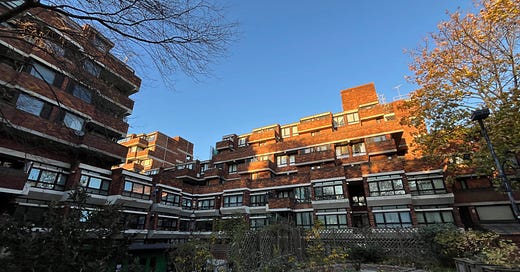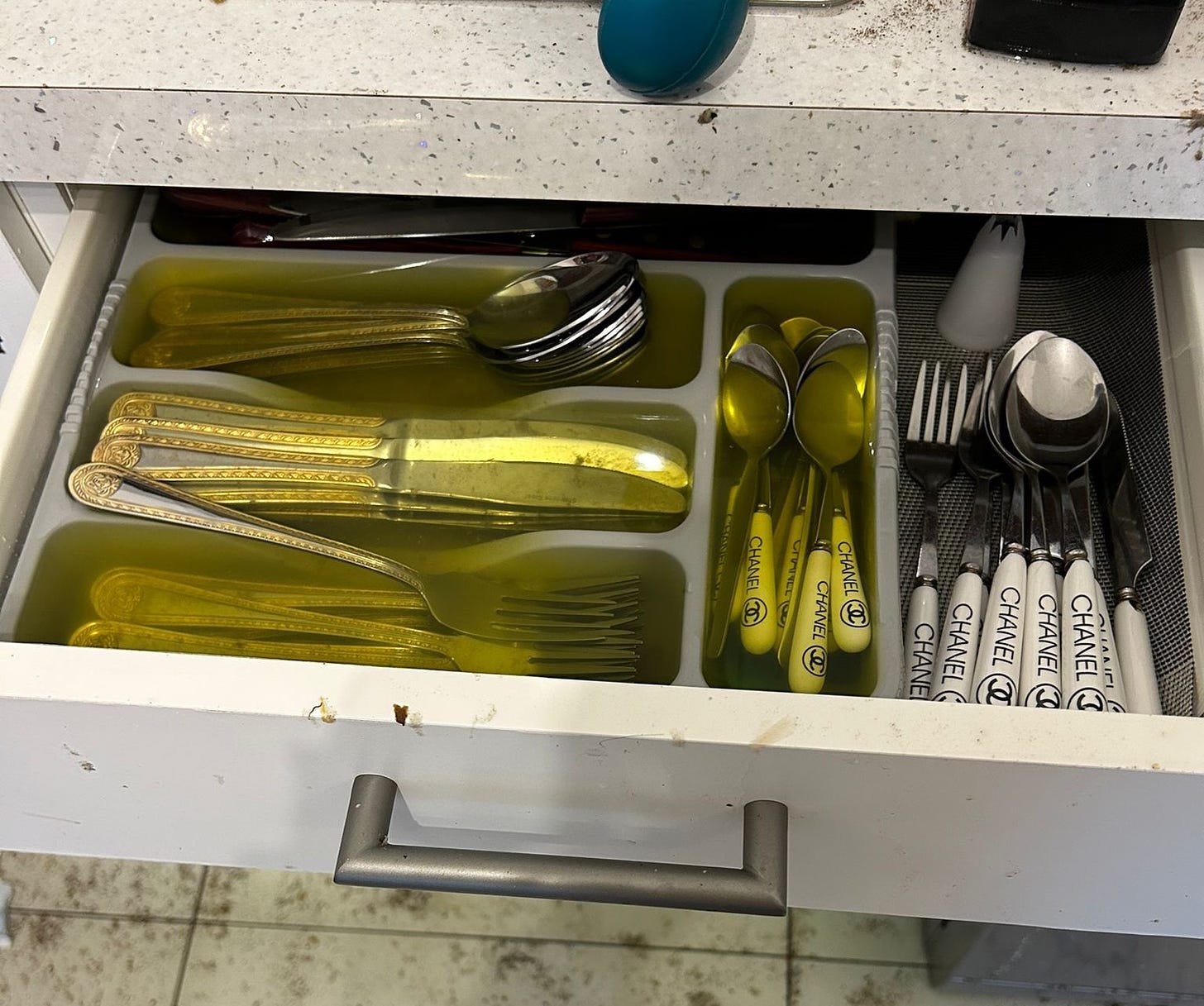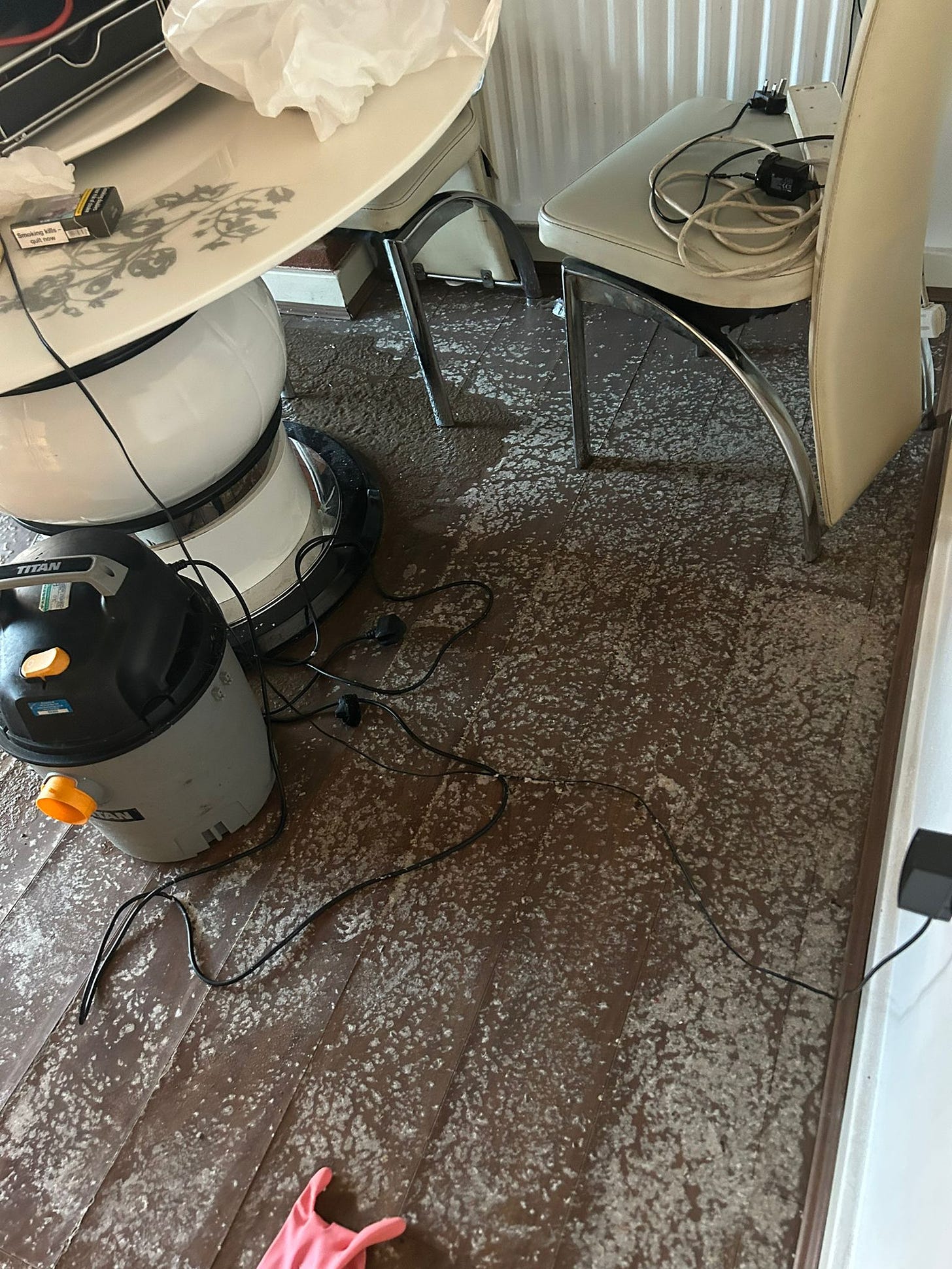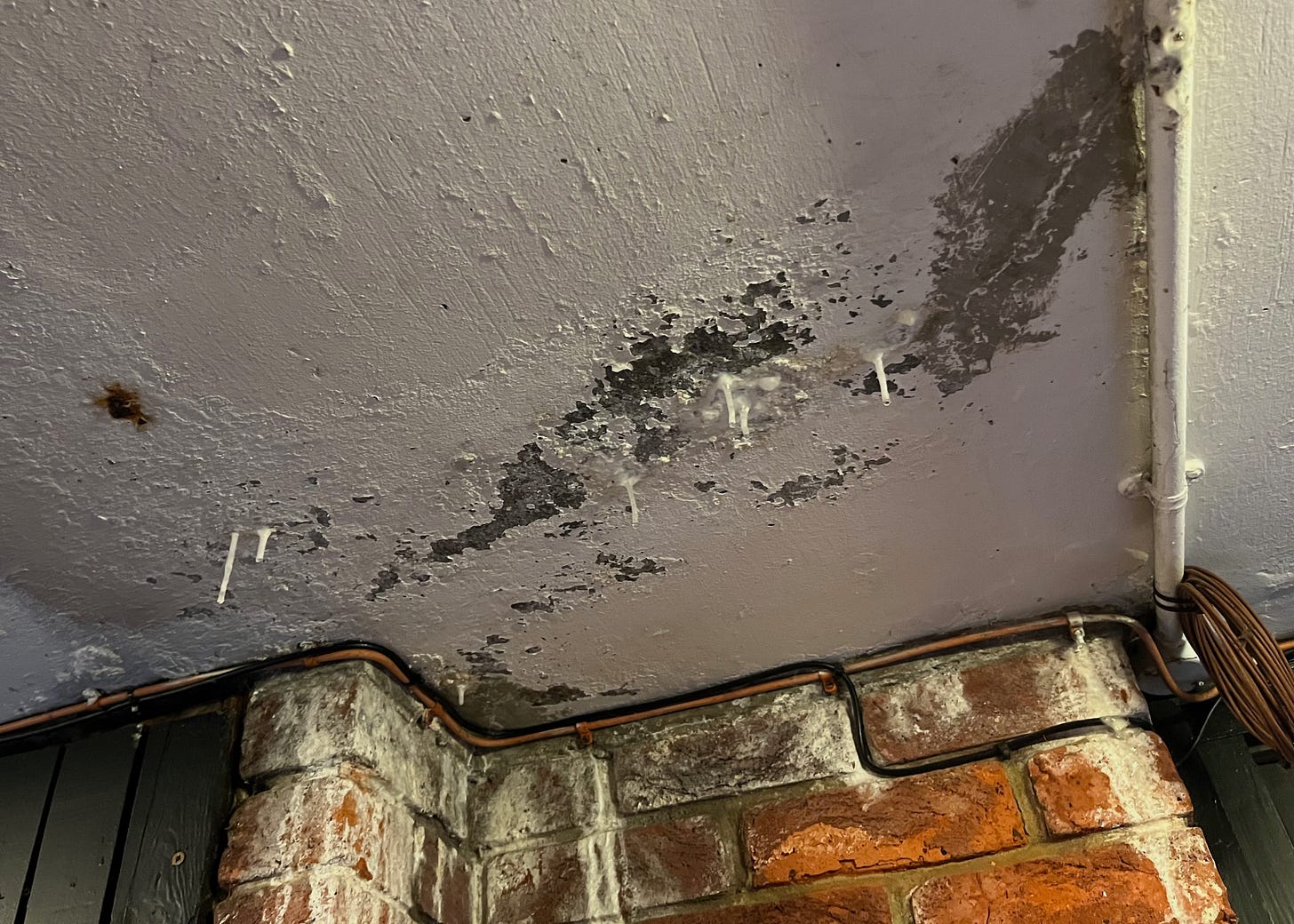"I was covered in human poo": One family's shocking story of London's housing crisis
Plus: Otters are getting closer to the centre of London.
Welcome to London Centric, where we are still mulling the huge response to Friday’s investigation into how Westminster Bridge became lawless. Thousands of new subscribers joined the mailing list after reading it and the comments both on the piece and on Bluesky were filled with people sharing their anecdotes about how chaotic the area has become. This type of journalism takes time and resources, and is only possible thanks to the support of paying members.
On Sunday, two days after the piece was published, Westminster Bridge was closed following a fight which ended with a man fighting for his life and three people arrested on suspicion of attempted murder in the shadow of parliament and New Scotland Yard.
Today’s story is another shocking insight into life in London, about a young family dealing with appalling housing conditions. A word of warning: it is best not read over lunch, as it features human sewage running through their home.
Scroll down to read it now.
“London’s most urban otter”.
A wild otter may have been spotted in Barking, just ten miles from central London, in a sign of the capital’s ongoing rewilding.
Paul Powlesland, a barrister and environmental activist who lives on a boat on the River Roding, spotted the webbed mustelid on a riverbank next to the Big Tesco on the North Circular road.
He told London Centric he began searching for the animal after being messaged on Instagram by a person claiming they’ve seen an otter on the way back from the shops: “I assumed they must have seen a mink. I just didn’t think they could come this far down.”
Powlesland said the location might make them “London’s most urban otters” and he has “pretty much no doubt” about the positive identification after talking to otter experts: “This is also a clear reason why we need to get water quality sorted. It’s depressing to think what they might be swimming in.”
He said the otter could make a home (know as a ‘holt’) on the Roding, where trees are growing up. However, the Thames remains inhospitable to the animals due to the nature of its banks: “Having concrete or metal sheer sides is the worst thing you can do to a river — no life can live in deep water or near a metal edge. Wherever there’s a tree it brings life: kingfishers, herons, and now otters.”
Closing time, open all the doors.
It’s been a busy 24 hours for things shutting down in London. Smithfield meat market is going (permanently, after 850 years), the Groucho club has gone (possibly temporarily, after 39 years), and the signals on the Elizabeth line seem to have keeled over (hopefully temporarily, after two years). London Centric is interested in all of these so please click here to send a WhatsApp or email if you know the real story behind the headlines and we’ll get reporting.
Overground still on Underground.
If you’ve taken a London Overground train this week then you’ll have found yourself on one of six newly-named lines (the timing of the rollout was first confirmed a couple of weeks ago in London Centric).
The £6.3m project tidies up a lot of the network but there’s not enough money in Transport for London’s bank account to complete the rebranding job across the whole network. This means the old London Overground name and colours will continue to appear on maps and announcements used on the London Underground, Docklands Light Railway, and Elizabeth line trains for years to come — another example of how the capital’s transport network is short on money.
London Centric investigates the capital’s housing crisis: “I just broke down in tears.”
When Jason Stevenson first called Westminster Council last December about the raw sewage flooding into his flat he never expected it to turn into an eight-month saga that would put him in hospital, cause his children to drop out of mainstream education, and leave him unsuccessfully begging to be relocated.
“It was constant, it would not stop,” he says as he shares a video of how the pipes in his flat’s kitchen began gushing out sewage. “It smelled acrid. It literally made me sick.”
At first Jason thought it was an isolated issue with his plumbing as the fetid material began to bubble out of the sink. Then the sewage started filling drawers and spreading out throughout the whole property in Lillington Gardens, a Grade II-listed housing estate in Pimlico, central London. He and his wife Denisa, both already dealing with serious long-term health issues, started mopping up the waste as best they could while asking their four children to stay in other rooms of the ground floor flat. But the sewage kept coming, all through the night.
Jason ended up ripping off a glass sliding door to build a barricade within his home against the human waste, while his children tried to sleep in other rooms: “It was a massive amount of pressure and just continued to pour over, and it went all the way through the whole flat, into our bedrooms, the living room.”
Jason agreed to speak to highlight the urgency of London’s housing crisis, on the condition he was not photographed. He said his confidence had been severely shaken by an ordeal that would leave anyone feeling their dignity was affronted. “It’s embarrassing,” he said, “I was covered in human poo.”
Sitting beneath bible verses on the wall of the flat they have recently returned to, he told London Centric the story for the first time. Jason believes there are systemic issues with the maintenance of social housing in the city and with how councils approach repairs. They focus too much on remedial rather than preventative works, benefitting contractors rather than residents, he said, when what’s really needed is a effort to fix the root causes of the problems. He claimed the council had failed to maintain the drains on the estate, along with a large number of other issues which could have saved them a lot of money in the long run.
Despite repeated visits from council officials over several days there was seemingly little that could be done about the material that was leaking through their family home. Jason worked for three days straight throughout the night to try to keep the sewage at bay and out of his family’s bedrooms: “I stayed up the first night until five o'clock in the morning. Just mopping and mopping and mopping. There was times that I had to sleep because you can't actually keep going.”
Denisa has photographs of their dishwasher filling up with so much waste water that it became a metal canister of sewage, the weight too big to open without risking a tidal wave spreading throughout the house.
On the third day of the sewage flooding his house Jason collapsed on the shoulder of a council official, who he praised for his humanity: "I just broke down in tears and said ‘I don't know what to do’. I didn't even cry when my mum passed away.”
Managers and contractors turned up but were unable to find a solution, eventually physically smashing up the pipes to stop the flow. Days later Jason was hospitalised in “horrific pain” with a stomach complaint: “It was so horrific, I was covered in it. I was so unwell. I started getting temperatures.”
Before the sewage leak the family had dealt with years of other problems in the flat, which sits within a section of the architecturally-lauded housing estate which was converted from an old people’s home into family flats. They believe the conversion was bodged — at one point the ceiling collapsed to reveal a street light, covered up as part of the conversion, that had been burning electricity for decades — while a separate leak that had collapsed the living room ceiling had been going on for years. The mould in the flat had affected their son’s health. But the sewage leak felt like a new level of degradation.
Their story is yet another example of the cruelty of a housing crisis in a city where poorly-maintained social housing properties sit next to some of the world’s most expensive properties. A hundred metres from Jason and Denisa’s front door is Vincent Square, where Robert Jenrick, the runner-up in the Tory leadership election and a former housing minister, lives in a £4m Georgian townhouse. Stand on the roof of the Lillington Estate and you can see the Palace of Westminster.
Daniel Hewitt, investigations editor at ITV News, who has recently released an engrossing and listenable podcast series exploring the housing crisis, said the story was symptomatic of the social housing crisis in the capital. London’s councils are struggling with lack of supply, decades of limited investment, and ageing post-war buildings that are reaching the end of their lives — with no money available to replace them.
He said councils often wait until a leak or mould is out of control before acting: “Then they go in and find other problems while they’re there. Often the building is in such bad condition they go in and find loads more problems and the family is stuck in temporary accommodation for a long time.”
Hewitt added that years of chronic social housing shortages mean that, “even subconsciously”, there’s rarely a rush to fix properties because social housing residents have no other choice but to wait: “The family aren’t going to go off and leave, they’re not a customer, they can’t vote with their feet. It’s squalor or the streets. They stay, they complain, but they’ve got the golden ticket of a social home in London.”
Unable to find them a place to live locally due to the housing shortage, the council moved the Stevenson family first to a hotel near Heathrow Airport, then to Queensway near Notting Hill where six of them shared a single room for months. Struggling to attend their old schools, Jason’s children dropped out of mainstream education and are now homeschooled. Jason’s oldest daughter, who is autistic and copes badly with change, stayed in the Westminster area with his sister, splitting up the family over Christmas.
Although it is shocking, the story of what happened to the Stevenson family is perhaps not surprising. Their block of flats is nicknamed “Leaky Lillington” due to issues with the sewage and heating network. When London Centric visited the estate, which is on first glance in good condition, two council employees were hosing down a car that had been covered in sewage as part of a separate leak. In another area of the building a leak had been going on so long that stalactites are forming on the ceiling.
Stevenson said he had no faith in the council and the repairs system which, he believes, fails to confront the underlying failure of the building: “It's just a license for contractors to print money. Basically, they come here, review it, do a survey, they scratch their heads, they take a few pictures, do a drawing and then they leave. And then five years later they might come and hopefully fix it. It’s literally crumbling.”
A few floors up in Charlwood House, the same part of Lillington Gardens that was converted from an old people’s home, is Charm Williams, who works in communications and lives in a flat with her mother. She said they live with “infestation and leaks”, with mould spreading around the flats, ants breeding and the ceiling repeatedly collapsing.
She said her family had no faith the building could be saved: “It needs to be torn down. The people moved into these conversions need to be re-homed. Their excuse is that the whole estate is listed. But this is a listed building that’s not being cared for.”
Williams said the maintenance staff don’t even have diagrams showing where they should try to track down leaks: “They don’t know where pipes are going. People shouldn’t be living here. It’s a ticking time bomb.”
Hewitt, the ITV investigations editor, said he had increasingly come to the conclusion that it is time for many post-war social housing blocks in poor condition to be demolished and rebuilt, while accepting this comes with “severe” social consequences and the loss of community: “The problem with trying to replace housing stock when it’s depleted is there’s nowhere to put the families while it’s replaced.”
He also said he had some sympathy with the councils who have been victims of central government’s retreat from the housing market: “The state has, over successive governments, absolved the responsibility for housing its citizens. You get into a position where the council has so few levers to pull. You can only fix it so much. And if you move them out while you fix it it’s expensive.”
As a result the capital’s hotels are filled with people paid to be there by councils in so-called temporary accommodation: “You go to a Travelodge in Enfield and 80% of the people living there are homeless.”
As for the Stevensons, the family ultimately received compensation of around £2,000 and the flat was, after eight months, repaired to a good standard. But the memories of fighting back a wall of sewage in their family home, in one of the richest areas of the UK, live on. Denisa said she panics whenever she hears a drip in the flat and would like to leave a building she considers no longer fit for purpose.
A spokesperson for Westminster council, which recently switched from Conservative to Labour political control, said “historic underinvestment” in the estate and its heating systems had left a large number of problems that needed solving.
They added: “The Stevenson family were provided with alternative accommodation throughout a complicated repair. The case was subject to a thorough complaints process and the family have been compensated. We continue to work hard to address the ongoing issues experienced at Charlwood House, making repairs as quickly as possible.”
Hewitt said there needs to be an enormous investment by central government to make up for decades of short-term fixes on London’s housing estates: “The obvious answer is you’ve got to build more housing and that takes time. We’re in such a mess.”
Do you have any feedback on this edition of London Centric? Leave a comment, click here to send a WhatsApp, or get in touch via email.
Have you read these recent editions of London Centric?











>A hundred metres from Jason and Denisa’s front door is Vincent Square, where Robert Jenrick, the runner-up in the Tory leadership election and a former housing minister, lives in a £4m Georgian townhouse. Stand on the roof of the Lillington Estate and you can see the Palace of Westminster.
Maybe this is the market signalling that it doesn't make sense to house Jason there.
This article states clearly: people in Zone 1 council flats have such a golden ticket that they won't leave for a private rental even when covered in sh*t!
I live above where this happened and it affected me and the other flat below me, this is not a new thing going on this happens all year round where the two flats below start getting back surge then I can’t use my water at all as dont want to add to problem with people being flooded, I went without water for 5 days the last time had to buy it, the council didn’t even offer to get water for me, now have problem with heating, this council is a joke